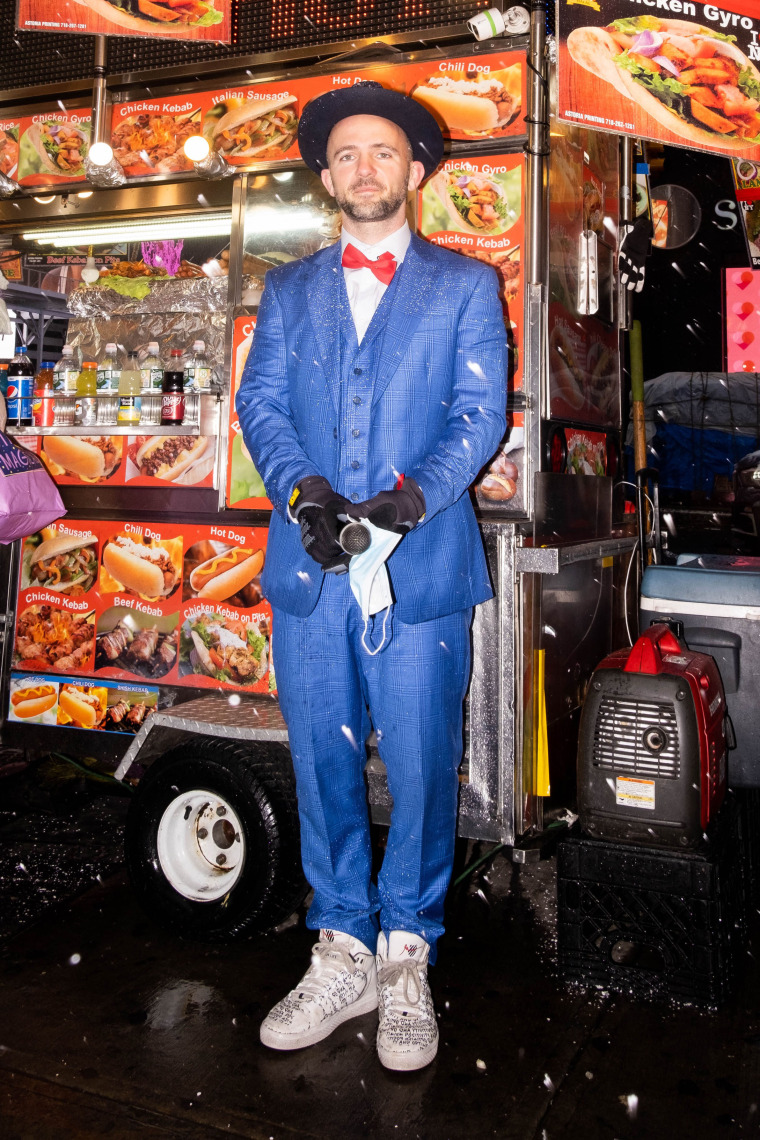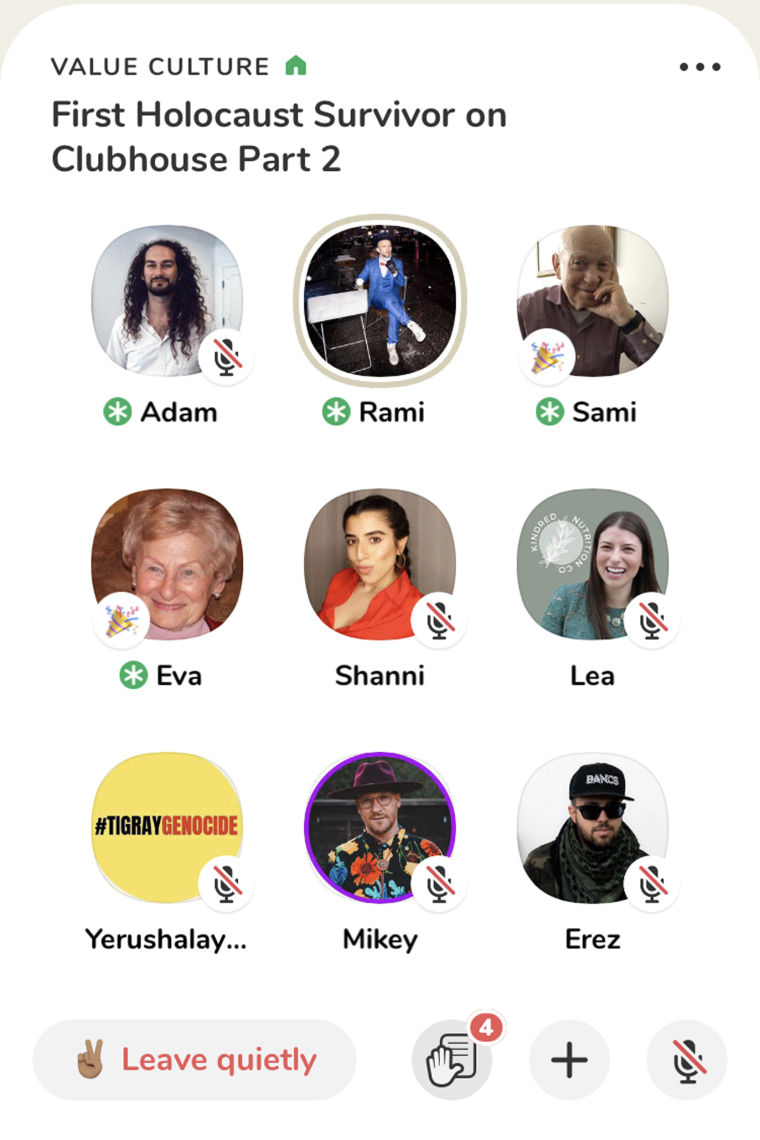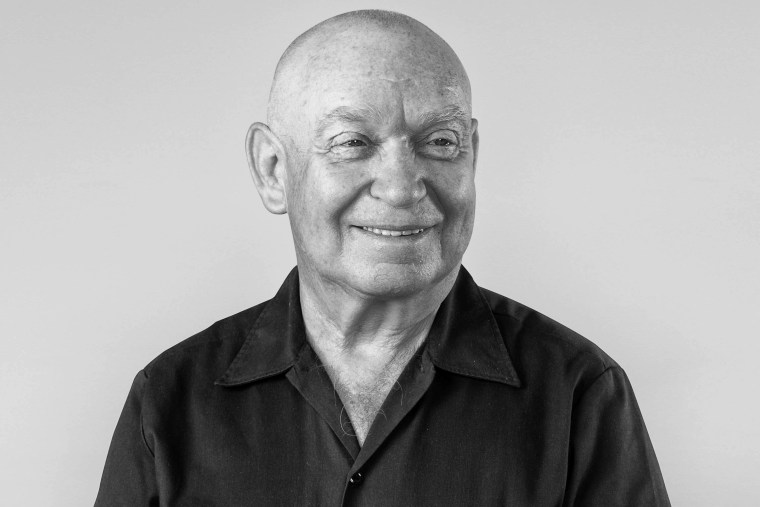Holocaust survivor Sami Steigmann had given speeches at many events over the years about his experiences, but none of them had lasted 16 hours or included thousands of people from around the world.
That changed Jan. 27, International Holocaust Remembrance Day. With an invite to the audio-focused social networking app Clubhouse, he engaged in a question-and-answer session moderated by the rapper Kosha Dillz and nonprofit event producer Adam Swig.
"I had never heard of Clubhouse," Steigmann, 81, said. "When they started a room and got 1,000 people in it, for me, it was a complete shocker."
His marathon session sparked two more multihour chatrooms, including one with civil rights leader Martin Luther King Jr.'s counsel and speechwriter Clarence B. Jones, which brought many thousands of people together to hear firsthand accounts from Steigmann, ask questions, share their own experiences with genocide and hate, and bring awareness to alleged human rights abuses in the Tigray region of Ethiopia and against the Uyghurs in China.
"I fight hatred," said Steigmann, who survived Nazi medical experiments as a baby. "I am also fighting for other ethnic groups. I am also talking about the Uyghur people. No ethnic group, no human being should be persecuted or hurt. There is only one race, the human race."
Steigmann was invited to the app by Dillz, whose real name is Rami Matan Even-Esh, and Swig, who said they have seen anti-Semitism spread online including on Clubhouse, which has grown quickly but become a target of criticism over its moderation politics. While aware of the broader trends, they said they were motivated to bring Steigmann onto the new app, which is currently invite-only, as a result of their personal experiences with anti-Semitism and Holocaust deniers on Clubhouse, as well as what they felt was an overall dearth of meaningful conversations.

"We thought the best way to combat those lies was to bring on a survivor, a witness to history and I think most people have never met a Holocaust survivor, or heard a survivor. It was such a moment for people to connect the dots and see this is real," said Swig, who runs a nonprofit called Value Culture, which creates cultural events that help engage young people with philanthropy.
"It's more powerful than we thought," Dillz said, pointing out the diverse audience which included descendants of survivors, as well as descendants of Nazis, and the high level of interest.
The success of Steigmann's rooms comes at a nadir of Holocaust education among young people and a rise in anti-Semitic hate crimes. It also arrives at a moment when governing standards around social media networks have never been more fraught.
According to a study commissioned by the Conference on Jewish Material Claims Against Germany, almost half of millennial and Gen Z respondents could not name any concentration camps and 63 percent did not know that 6 million Jews were murdered. The FBI reported that over 60 percent of religious-based hate crimes were directed at Jews in 2019, with over 1,032 victims, which is the second most victims of any group, and represents an increase of 14 percent compared to 2018.
Mark Bailey, 37, joined from London and was drawn by "a subject that hadn't already been discussed 10 times that day" on an app he says is a "toxic place at the best of times." He said he had never met a Holocaust survivor and was also drawn in by the chance to hear a firsthand account from one.
"[The] main lesson is hoping that people's experiences, whether they're still here or not are remembered and discussed in the correct manner; I don't understand how people who were not there deny that it happened," he said.
Also joining Steigmann in one of his rooms was Tahir Imin Uighurian, a political science scholar and Uyghur activist who has said he was jailed by the Chinese government for political reasons and whose family has faced retaliation from Beijing. He met Steigmann at a United Nations event last summer and said he was happy to see his name pop up in Clubhouse.
"I just shared my story about the Uyghur issue," he said. "I need to remind people that if you really want to remember and care about human rights and stop genocide, the Holocaust was in the past and now it's happening to the Uyghur people, as recognized by the U.S., Canada, and the Netherlands."
Beijing has repeatedly denied any mistreatment of its Uyghur minority.

The Clubhouse event encapsulated two key elements of Holocaust education, according to Gretchen Skidmore, director for Education Initiatives at the U.S. Holocaust Memorial Museum, — namely, "meeting young people where they are" and firsthand testimonies, which she called the "most powerful way to learn history, especially Holocaust history."
Noting broad declines in humanities and history education in the United States, she said Holocaust education is particularly relevant because of the universal lessons it can provide.
"One of the lessons is about unchecked anti-Semitism and the fragility of society. Understanding the Holocaust can help us understand the power of individuals, and how ordinary people can play a role," she said. "Any gaps in knowledge of the Holocaust is a cause for concern."
Skidmore said that the spread of Holocaust denial has been accelerated by social media and that a goal of the museum is to "counter this with accurate Holocaust education. That means the education has to be accessible on many platforms."
Finding a bright spot amid the negative educational trends, she pointed out that 80 percent of respondents to the recent study felt that Holocaust education is important and 64 percent felt is "should be compulsory in school."
Since it launched in April 2020, Clubhouse has grown quickly in valuation, users and buzz. Recent rooms featuring Tesla CEO Elon Musk, Microsoft co-founder Bill Gates and Facebook CEO Mark Zuckerberg, along with the release of more invites, have helped take it from a niche product to one that increasingly has mainstream cultural relevance. It has also been the site of ongoing racist, sexist, misogynistic and anti-Semitic attacks, in addition to hosting rooms dedicated to criticizing specific individuals.
A Clubhouse spokesperson declined an interview request and said in a statement: "All forms of racism, hate speech and abuse are prohibited on Clubhouse and are a direct violation of the Community Guidelines and Terms of Service. The company has trust and safety procedures in place to investigate and address any violation of these rules, which may include suspension or removal from the app."
Nevertheless, despite the app's decision to record and temporarily save rooms that are flagged by users for violations, rooms are routinely dedicated to discussing and trying to end instances of hate speech and threats. Multiple users who spoke to NBC News, including Jason Steinhauer, a public historian, and Alex Lieberman, a New York student, shared accounts of rooms featuring anti-Semitic abuse from users.
Still, Steinhauer, who runs a history-focused club on the app with over 60,000 members and has hosted a room about the Holocaust, does not believe it poses a more significant threat than existing platforms.
"If you're looking for social media platforms that have elevated dictatorial elements in our society, we don't have to look very far," he said.
Lieberman, a prolific moderator on the app, hosts many rooms focused on Jewish and Israel-based themes. He said that while he sees anti-Semitic abuse increasing, he also values the platform as a useful way to connect with people.
"I've taken nights off, but I'm not going to get off the app. At the end of the day, they're great conversations, but it does get frustrating," he said.
About his Holocaust-focused room, Steinhauer said he was "incredibly moved and heart warmed by the conversation itself."
Reflecting on his new platform, Steigmann, who has over 5,000 followers on the app, thanks Swig and Dillz for bringing him to a "new age."
"It's a very powerful tool. It's a very powerful tool to promote hatred, we have to find a balance," he said.
But even with his new social clout, Steigmann maintains the same guiding philosophy.
"I cannot change anybody, no one can change anybody, you can change only somebody's perspective. Then they will have to do the research and change and everything else."
